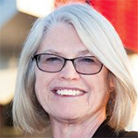We are pleased to announce our latest class of ORCID board members! The ORCID Nominating Committee put up a slate of nominees for the six open seats on our 15-member Board. All 582 of our organizational members as of 15 November 2016 were eligible and provided credentials to vote in an on-line election, open from 15 November to 14 December 2016. We formalized the vote during an in-person Members meeting on 15 December 2016.
We thank our membership, 40.7% of whom voted, for your participation in this important process. And I thank the Nominating Committee, in particular the Chair, Robert Kiley of the Wellcome Trust, for their hard work and dedication. Finally, I thank our outgoing Board members for their exemplary service to ORCID: Hideaki Takeda, of NII and Thomas Hickey of OCLC, who have been with ORCID since before there was a Board; Marta Soler, who brought her expertise in Social Sciences and Humanities to the Board as our researcher member; and Daniel Forsman of Chalmers University of Technology who brought a technical library perspective and clarity on issues of privacy.
Please join us in welcoming our new and returning Board members, whose three-year term will commence on 1 January.
Patricia Brennan (Second term)
 As Vice President, Engineering and Product Management Thomson Reuters (now Clarivate) Intellectual Property & Science Division, Brennan is responsible for Platform Applications and Development including Web of Science and InCites. Brennan joined Thomson Reuters in 2001 with roles in Editorial Development and Journal Selection, Product Management, and Technology Development. Previous, she held positions at Harvard University and the Association of Research Libraries. At ARL, Brennan created ARL-Announce, its first online communications program. In addition to serving on the ORCID Board, she has been active in national information standards initiatives in the US, chairing the NISO Business Information Topic Committee, serving on the COUNTER International Advisory Board and the Audit Committee, and the NFAIS Statistics and Usage task force. Brennan has an MS in Library and Information Science from The Catholic University of America and a BA in English Literature from the University of Maryland, College Park.
As Vice President, Engineering and Product Management Thomson Reuters (now Clarivate) Intellectual Property & Science Division, Brennan is responsible for Platform Applications and Development including Web of Science and InCites. Brennan joined Thomson Reuters in 2001 with roles in Editorial Development and Journal Selection, Product Management, and Technology Development. Previous, she held positions at Harvard University and the Association of Research Libraries. At ARL, Brennan created ARL-Announce, its first online communications program. In addition to serving on the ORCID Board, she has been active in national information standards initiatives in the US, chairing the NISO Business Information Topic Committee, serving on the COUNTER International Advisory Board and the Audit Committee, and the NFAIS Statistics and Usage task force. Brennan has an MS in Library and Information Science from The Catholic University of America and a BA in English Literature from the University of Maryland, College Park.
Andrew Cormack
 Serving as chief regulatory adviser for Jisc technologies since 2004, Cormack keeps Jisc technologies and customers of the Janet network informed about the legal, policy and security issues around networks and networked services. He joined and joined JANET, the UK’s National Research and Education Network, as Head of CERT in 1999. Prior, he was a programmer and internet systems administrator at Cardiff University and a Senior Scientific Officer at NERC. Cormac is a member of European and global incident response and federated access management communities, and in 2016 served on the ORCID Trust community advisory group. He has an MA in Maths from the University Cambridge, Bachelors and Masters degrees in law, and has published papers on legal issues in incident response, domain names, Internet identifiers, and learning analytics.
Serving as chief regulatory adviser for Jisc technologies since 2004, Cormack keeps Jisc technologies and customers of the Janet network informed about the legal, policy and security issues around networks and networked services. He joined and joined JANET, the UK’s National Research and Education Network, as Head of CERT in 1999. Prior, he was a programmer and internet systems administrator at Cardiff University and a Senior Scientific Officer at NERC. Cormac is a member of European and global incident response and federated access management communities, and in 2016 served on the ORCID Trust community advisory group. He has an MA in Maths from the University Cambridge, Bachelors and Masters degrees in law, and has published papers on legal issues in incident response, domain names, Internet identifiers, and learning analytics.
Richard de Grijs (Researcher)
 Richard de Grijs joined the Kavli Institute for Astronomy and Astrophysics at Peking University (China) in 2009 as a full professor; and served as acting associate director in 2012–2013. After completion of his PhD at the University of Groningen (Netherlands) in 1997, he held postdoctoral fellowships at the Universities of Virginia (USA) and Cambridge (UK), followed by a faculty appointment at the University of Sheffield (UK). Richard has been a Scientific Editor of The Astrophysical Journal (American Astronomical Society) since 2006 and was promoted to Deputy Editor of The Astrophysical Journal Letters in 2012. He is Director of the East Asian Regional Office of Astronomy for Development (International Astronomical Union), as well as Discipline Scientist (Astrophysics) at the International Space Science Institute–Beijing. He was awarded the 2012 Selby Award for excellence in science by the Australian Academy of Science and a 2017 Erskine Award by the University of Canterbury (New Zealand), as well as visiting professorships by, among others, the Royal Netherlands Academy of Arts and Sciences (at Leiden University) and at Shanghai Astronomical Observatory.
Richard de Grijs joined the Kavli Institute for Astronomy and Astrophysics at Peking University (China) in 2009 as a full professor; and served as acting associate director in 2012–2013. After completion of his PhD at the University of Groningen (Netherlands) in 1997, he held postdoctoral fellowships at the Universities of Virginia (USA) and Cambridge (UK), followed by a faculty appointment at the University of Sheffield (UK). Richard has been a Scientific Editor of The Astrophysical Journal (American Astronomical Society) since 2006 and was promoted to Deputy Editor of The Astrophysical Journal Letters in 2012. He is Director of the East Asian Regional Office of Astronomy for Development (International Astronomical Union), as well as Discipline Scientist (Astrophysics) at the International Space Science Institute–Beijing. He was awarded the 2012 Selby Award for excellence in science by the Australian Academy of Science and a 2017 Erskine Award by the University of Canterbury (New Zealand), as well as visiting professorships by, among others, the Royal Netherlands Academy of Arts and Sciences (at Leiden University) and at Shanghai Astronomical Observatory.
Daniel Hook
 Daniel Hook was appointed Managing Director, Digital Science in July 2015. He has been involved in research information management and software development for more than a decade and a vocal advocate for open access and open data for several years. Hook has held positions as Director of Research Metrics at Digital Science, Co-founder and CEO of Symplectic and COO of Figshare. By training, he is a mathematical physicist specializing in quantum theory. Hook continues to be an active researcher holding visiting positions at Imperial College London and Washington University in St Louis. He holds Bachelors, Masters, and Doctoral degrees in physics from Imperial College London is a Fellow of the Institute of Physics in the UK.
Daniel Hook was appointed Managing Director, Digital Science in July 2015. He has been involved in research information management and software development for more than a decade and a vocal advocate for open access and open data for several years. Hook has held positions as Director of Research Metrics at Digital Science, Co-founder and CEO of Symplectic and COO of Figshare. By training, he is a mathematical physicist specializing in quantum theory. Hook continues to be an active researcher holding visiting positions at Imperial College London and Washington University in St Louis. He holds Bachelors, Masters, and Doctoral degrees in physics from Imperial College London is a Fellow of the Institute of Physics in the UK.
Linda O’Brien
 As Pro Vice Chancellor, Information Services at Griffith University, O’Brien is a member of the University Executive leading the development and implementation of university information strategy. She has substantial executive leadership experience in the tertiary education sector having worked in six Australian universities including the roles of Vice Principal, Information and Chief Information Officer at the University of Melbourne, and Vice President, University Services at the University of Newcastle. O’Brien has published and presented nationally and internationally in her field, and contributed to a number of state and national initiatives including: Chair, Australian Open Access Working Group (2016) – developing a national statement on open access to Australia’s research outputs; CAUL Representative on the Australian ORCID Working Group Australia (2015), which developed the Joint Statement of Principle: ORCID – connecting researchers and research and established the Australian ORCID Consortium comprising of 40 universities and research institutions; Chair of the Australian ORCID Advisory Committee; Co-Principal Investigator for the NMC Horizon Project’s Technology Outlook: Australian Tertiary Education 2012-2017; and as member of the eResearch Expert Working Group (2011), which developed the 2011 Strategic Roadmap for Australian Research Infrastructure. She is currently a board member of the Queensland Cyber Infrastructure Foundation (QCIF), Open Data Institute Queensland (ODIQ), a member of the Queensland Public Records Review Committee, and Chair of the Council of Australian University Librarians Research Advisory Committee (CRAC). O’Brien has a Master of Public Administration, a Graduate Diploma in Library, Information Science, a Bachelor of Education, and a Corporate Directors Diploma.
As Pro Vice Chancellor, Information Services at Griffith University, O’Brien is a member of the University Executive leading the development and implementation of university information strategy. She has substantial executive leadership experience in the tertiary education sector having worked in six Australian universities including the roles of Vice Principal, Information and Chief Information Officer at the University of Melbourne, and Vice President, University Services at the University of Newcastle. O’Brien has published and presented nationally and internationally in her field, and contributed to a number of state and national initiatives including: Chair, Australian Open Access Working Group (2016) – developing a national statement on open access to Australia’s research outputs; CAUL Representative on the Australian ORCID Working Group Australia (2015), which developed the Joint Statement of Principle: ORCID – connecting researchers and research and established the Australian ORCID Consortium comprising of 40 universities and research institutions; Chair of the Australian ORCID Advisory Committee; Co-Principal Investigator for the NMC Horizon Project’s Technology Outlook: Australian Tertiary Education 2012-2017; and as member of the eResearch Expert Working Group (2011), which developed the 2011 Strategic Roadmap for Australian Research Infrastructure. She is currently a board member of the Queensland Cyber Infrastructure Foundation (QCIF), Open Data Institute Queensland (ODIQ), a member of the Queensland Public Records Review Committee, and Chair of the Council of Australian University Librarians Research Advisory Committee (CRAC). O’Brien has a Master of Public Administration, a Graduate Diploma in Library, Information Science, a Bachelor of Education, and a Corporate Directors Diploma.
Chris Shillum (Second term)
 Chris Shillum is currently Vice President of Platform and Data Integration for Elsevier, where he focuses on integrating data resources across silos to enable more personalized services for researchers and building out a new big data platform. Previously, he was responsible for the platform and systems which power online products such as ScienceDirect and Scopus. Shillum has worked in various capacities on Elsevier’s online products including ScienceDirect since its inception in 1997, in areas including contentmanagement, identity and access management, search and analytics. He holds a Masters in Electronic Systems Engineering from the University of York in the UK.
Chris Shillum is currently Vice President of Platform and Data Integration for Elsevier, where he focuses on integrating data resources across silos to enable more personalized services for researchers and building out a new big data platform. Previously, he was responsible for the platform and systems which power online products such as ScienceDirect and Scopus. Shillum has worked in various capacities on Elsevier’s online products including ScienceDirect since its inception in 1997, in areas including contentmanagement, identity and access management, search and analytics. He holds a Masters in Electronic Systems Engineering from the University of York in the UK.
How to get involved in the 2018 Election
In 2018, we will have four Board seats up for election. We encourage all of our members to submit recommendations to the Nominating Committee. Look for our call for nominations this spring. Please contact us if you are interested in serving on the Nominating Committee. The Committee charter describes the remit of this group.
We welcome your feedback!
This year marks the first time we have held an election open to our full membership; this follows a change in our bylaws voted on by our Board last year at this time. An important part of our ongoing work to ensure we meet our commitment to transparency and sustainability, the new elections process also has been a learning experience, not the least of which was setting up the online voting process from scratch.
After a call for recommendations, The Nominating Committee developed specific guidelines for reviewing nominees to ensure a balance of skills, experience, and regional and sectoral representation on the Board while also meeting bylaws requirements for non-profit majority.
ORCID staff’s responsibilities included identifying and setting up a reliable online voting system, including clear instructions on how to vote, as well as getting the word out about the nominations and voting processes. This requires up-to-date member contacts and tools to avoid spam filters, so we’ve spent a lot of time this year improving our member contact information and will be working with you to keep this updated going forward. Complying with legal statute requires offering an in-person voting option, which is challenging given our international membership. To address this challenge, we held an in-person Member meeting, hosted by Wellcome Trust, augmented by an on-line Webinar. Robert Kiley and Board Chair Ed Pentz presided, and ORCID staffer Josh Brown by power of attorney submitted the proxy vote on behalf of all members who had voted online.
We value your feedback on this year’s experience, and look forward to your participation in future elections!
